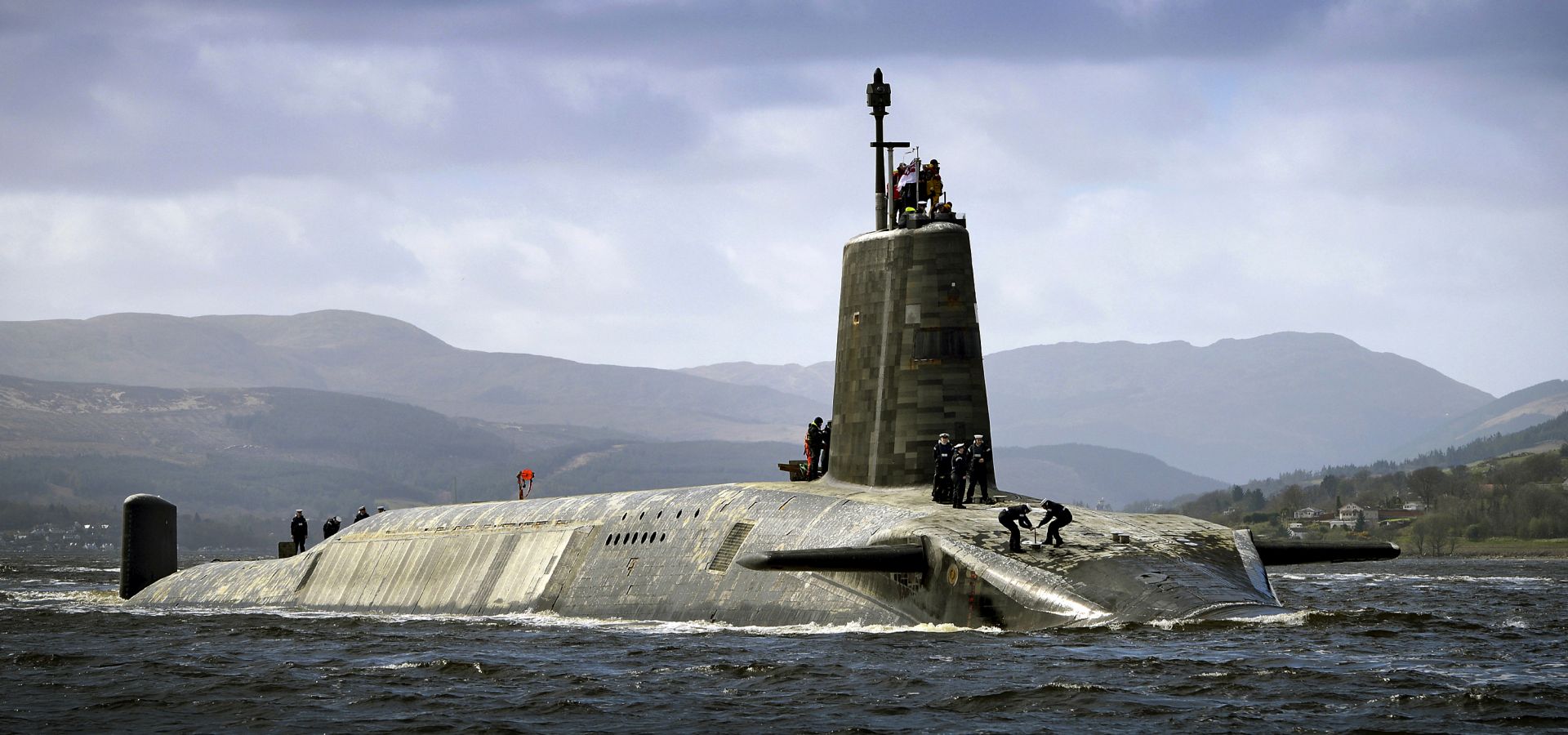Why has Hinkley C been approved, despite huge costs and public outcry? Dr Phil Johnstone summarizes the new report ‘Understanding the Intensity of UK Policy Commitments to Nuclear Power,’ raising questions about British transparency and democracy.

The HMS Vigilant carries the Trident ballistic missile, the United Kingdom’s nuclear deterrent (Photo by Thomas McDonald/MOD, edited, Open Government License)
As Hinkley C received the green light to go ahead last week, research published by the Science Policy Research Unit at the University of Sussex shows how intense British Government attachments to nuclear submarines help drive a strong bias in UK energy policy in favour of nuclear power.
This is despite nuclear power being recognised in the Government’s own detailed analyses to be expensive and otherwise “unattractive” compared to other low carbon options.
The report ‘Understanding the Intensity of UK Policy Commitments to Nuclear Power’ documents strongly-held views in UK defence policy, that nuclear-propelled submarines form a crucial military capability. Yet these are arguably the most complex engineered artefacts in the world, not easy for a country with a declining manufacturing base to build and maintain.
“On the military side, we found strong fears that without continued commitment to civil nuclear power, the UK would be unable to sustain the industrial capabilities necessary to build nuclear submarines” said report co-author Dr Phil Johnstone.
“We systematically examined a range of different possible reasons for official UK attachments to nuclear power”, said report co-author Emily Cox. “None of these are satisfactory to explain the intensity of support for nuclear power maintained by a variety of UK Governments. It seems that pressures to continue to build nuclear submarines form a crucial missing piece in the jigsaw”
“The Government’s own data shows the UK to be blessed with abundant, secure and competitive renewable energy resources”, said report co-author Professor Andy Stirling, “in a world turning much more to renewables than nuclear power, Britain might be expected to be taking a lead in these new technologies”.
Yet a greater priority in UK policy making appears to lie in maintaining ‘nuclear submarine capabilities’. Parliamentary Select Committee Reports and many other policy documents on the military side reveal intense pressures for strong Government support for skills and training, design and manufacturing and research and regulatory capabilities linking with the civil nuclear industry.
The report shows that these military pressures reached a peak in the crucial period 2003-2006 – with many new policy measures following on since then spanning civil and military sectors. During that same period, UK energy policy underwent a dramatic U-turn that has remained unexplained until now – from a view of nuclear power as “unattractive”, to a commitment to a “nuclear renaissance”.
“What this research suggests”, said report co-author Dr Phil Johnstone, “is that British low carbon energy strategies are more expensive than they need to be, in order to maintain UK military nuclear infrastructures. And without assuming the continuation of an extremely expensive UK civil nuclear industry, it is possible that the costs of Trident would be significantly greater”
The report illuminates many important cross-overs between UK submarine and civil nuclear supply chains. One defence policy document even considers the possibility to ‘mask’ some of the costs of nuclear submarine capabilities, behind spending on civil nuclear power.
“What is remarkable about this pressure for a nuclear bias”, continued Professor Stirling, “is that it is well documented on the military side, yet remains completely unacknowledged anywhere in official UK energy policy documentation. This raises serious questions about the transparency and accountability of decision making in this area – and the quality of British democracy in this regard”.
This article was originally published on the University of Sussex website, and has been republished with permission from Dr Phil Johnstone.
A good article.
The connection between atom power and the atom bomb is widely known on the EU continent.
Why is the British public left behind?
And why is Corbyn now giving in to the atom freaks ?
https://www.theguardian.com/uk-news/2016/sep/26/jeremy-corbyn-puts-aside-objections-to-renewing-trident
The UK will get clean base energy for 60+ years. Everyone caring for the environment should be very happy.
If only the Germans could have done the same, then coal could have been gone soon. Let’s hope we will learn from the German failure and put our effort toward reducing pollution and fossil fuels.
A very good article – showing that a significant part of the UK body politic is clinically insane – since nobody with two neurons to rub together would throw money at over-priced Franco-chinese state owned nukes, just so some nuke subs with missles that can NEVER be fired can keep going.
A village idiot with a lobotomy could make better decisions.
Thanks to the French atom disaster the UK is now (since Friday last) exporting increasing amounts of electricity to France(commercial exchange):
http://www.rte-france.com/fr/eco2mix/eco2mix-mix-energetique
Who needs the atom power plants but can’t afford them any more?
And who is so stupid and buys them ?
The UK might import power during the very same time as well (physical exchange), check with Entsoe.
Germany is exporting record amounts to France directly and via the Netherlands(commercial exchange),the cables must be running hot.
Power prices have rocketed:
http://www.reuters.com/article/france-power-idUSL5N1CB1BS
For futures 1st quarter 2017 the French EEX shows all time records: € 57.-/MWh for base and € 71.-/MWh for peak
Never had quarter futures be more expensive, even UK power is now cheaper.
One more from the NYT:
http://www.nytimes.com/2016/10/11/opinion/britains-nuclear-cover-up.html?_r=0
About the peaceful usage of the atom:
http://www.bloomberg.com/news/articles/2016-10-13/areva-said-to-extend-probe-of-le-creusot-forge-irregularities?cmpid=google
Since 1943 …….
Banzai!
World’s largest atom power plant stays closed:
http://www.japantimes.co.jp/news/2016/10/17/national/politics-diplomacy/anti-nuclear-candidate-yoneyama-leading-niigata-gubernatorial-election/#.WAP98BL_rcs
What the economists say:
http://www.platts.com/latest-news/electric-power/london/renewables-investors-shun-uk-on-brexit-nuclear-26579152